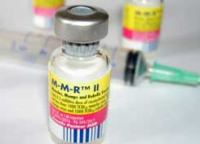Rubella Vaccination
 Overview
Overview
Rubella is an acute, typically mild viral disease which is transmitted through airborne droplets from infected people when they cough or sneeze. This disease usually affects children and young adults.
An infection of rubella just before conceiving or in early pregnancy can result in miscarriage or fetal death, as well as congenital defects which are known as congenital rubella syndrome, or CRS. The children most at risk for CRS live in countries where high amounts of women who are of childbearing age are susceptible to rubella.
An estimated 22,000 babies were born with CRS in Africa in 1996, 46,000 in Southeast Asia and almost 13,000 in the Western Pacific. By 2008 very few of these countries had introduced rubella vaccinations: therefore, the current rates for rubella in those regions are thought to be similar to 1996.
Large-scale rubella vaccination programs which took place during the past decade in developed and developing countries have nearly eliminated rubella and CRS.
The World Health Organization (WHO) recommends that all countries take advantage of introducing rubella-containing vaccines.
The Rubella Vaccine
Measles, mumps and rubella (MMR) vaccines can protect children (and adults) from all three of these common, childhood diseases. Children should get the first dose at 12 to 15 months and the second dose between the ages of three and five. Some infants younger than 12 months old may receive a dose of MMR if they will be traveling out of the country. This dose will not count toward their routine series of MMR.
Some adults should also get the rubella vaccine. Typically, anyone who is 18 years of age or older who was born after 1956 should receive at least one dose of the MMR vaccine unless they can show they were vaccinated or that they have previously had all three of the diseases (measles, mumps and rubella).
Vaccination Failure and Side Effects
Like all medications, a vaccine is capable of causing serious side effects, such as allergic reactions. However, the MMR vaccine has a very small risk factor for causing serious harm or death. Generally speaking, receiving the MMR vaccine is much safer than actually contracting rubella (or mumps or measles).
Recommendations and Considerations
Certain people should not get a vaccine or should wait to receive an inoculation. They include:
- Anyone who has had a life-threatening, allergic reaction of neomycin (an antibiotic) or any other component of the MMR vaccine, should not get this vaccine. People with severe allergies should consult their physician before getting inoculated.
- Anyone who had a previous reaction to a dose of MMR or MMRV (a vaccination that includes varicella for chickenpox) should not have this vaccine.
- People who are ill at the time the vaccination is scheduled should probably wait until they recover from their illness.
- Women who are pregnant should not take the vaccine. Those who have not had the vaccine should wait until they give birth. Those women who have had the rubella vaccination should wait for at least four weeks before becoming pregnant.
Others who should consult a physician before receiving this vaccination include: those with HIV or AIDS; anyone being treated with drugs that affect the immune system (such as steroids); people with cancer; individuals with a low platelet count; people who have received a different vaccination within the past 4 weeks; and those who have received a recent transfusion or other blood products.
References
- Ada, G.L. (2000).Vaccination : the facts, the fears, the future. Sydney, N.S.W. : Allen & Unwin
- Godfrey, M. & Anderson, R. (2002). Exploding the myth of vaccination. Tauranga : R. Anderson
- Scheibner, V. (1993). Vaccination : 100 years of orthodox research shows that vaccines represent a medical assault on the immune system. Blackheath, NSW : V. Scheibner
- Studer, Hans-Peter. (2010). Vaccination : a guide for making personal choices. Edinburgh : Floris
Posted in Rubella Vaccination
Ask a Question Or Join a Discussion


